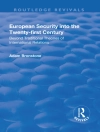The essential message of the ‘two regimes’ model is that the social politics of fatherhood have taken on a global significance and that the USA and Sweden represent two ends of an international continuum of ways of thinking about fatherhood. The key selling points of the two regimes model are its topicality, originality, its global appeal, and its particularised appeal to readers in the USA, the Nordic countries, Great Britain, Ireland, the European Union, Japan and China. The book offers students a comparative analytical framework and new insights into why some welfare states have ‘father-friendly’ social policies and others do not. The book makes an original contribution to the growing fields of welfare regime and gender studies by linking the epochal decline of patriarchal fatherhood to welfare state expansion over the course of the twentieth century and it raises new questions about the legitimacy of religiously inspired neo-patriarchy.
Cuprins
Introduction
1. Welfare, gender and fatherhood
2. The American model: state enforced agency
3. The Swedish model: state supported agency
4. Great Britain: full-time breadwinners-part time fathers
5. Ireland: ‘vulnerable fathers’, invisible fatherhood
6. The European Union and Scandivization
7. Crystalising the ‘Nordic Turn’ in Japan and the American model in China
8. Individualisation and two varieties of fatherhood and patriarchy
Index
Bibliography
Despre autor
Michael Rush is a Lecturer in Social Policy in the School of Applied Social Science at University College Dublin












